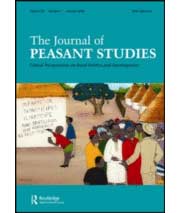Linking farmers' movements for advocacy and practice, 2010
Eric Holt-Giménez Guest Editor; Roland Bunch; Jorge Irán Vasquez; John Wilson; Michel P. Pimbert; Bary Boukary; Cathleen Kneen. Journal of Peasant Studies 37: 1, 203-236

Photo: Journal of Peasant Studies
While the potential synergies between a global peasant federation advocating food sovereignty and far-flung smallholder movements practicing agroecology may seem obvious, efforts to bring agrarian advocacy to farmer-to-farmer networks have run up against the historical distrust between development NGOs implementing sustainable agriculture projects and the peasant organisations that make up the new agrarian movements.
Aside from having assumed many of the tasks previously expected of the state, NGOs have become an institutional means to advance social and political agendas within the disputed political terrain of civil society. Within the institutional landscape of agricultural development some NGOs are enrolled either directly or indirectly in the neoliberal project. Others are simply doing what they do best and tend to look out for their own programmes. But others are deeply concerned that advancing the practices of sustainable agriculture without addressing the conditions for sustainability will ultimately end in failure.
These NGOs are potential links to vast informal networks of smallholders who are committed to transforming agriculture. Over the last thirty years the farmers in these networks have demonstrated their capacity to share information and knowledge. Their commitment to agroecological agriculture has resulted in a body of agrarian demands specific to sustainable peasant agriculture. It is now common among these farmers to hear the term food sovereignty. However, because most of these farmers do not belong to the farmer organisations that make up Via Campesina, there are few, if any, avenues for them to exercise this commitment politically.
In this Journal of Peasant Studies Grassroots Voices section seven prominent agrarian advocates and long-time agroecological practitioners directly address the challenges of integrating these two trends in contemporary peasant movements.



